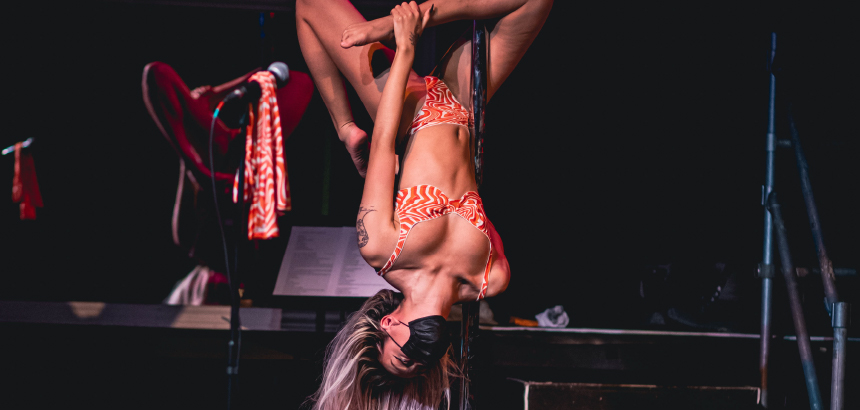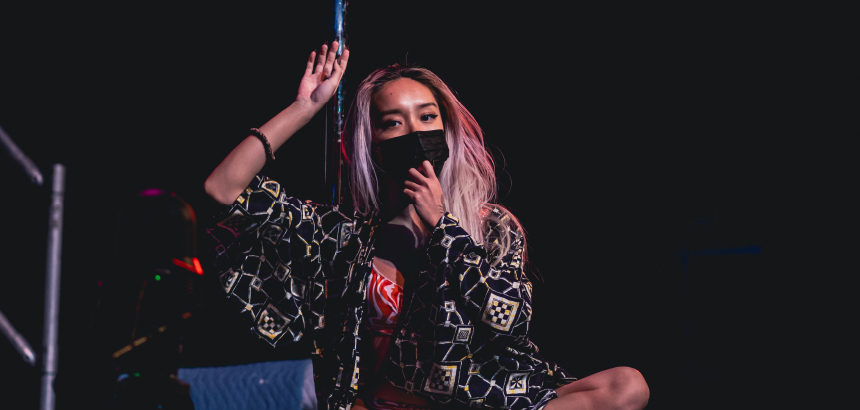Girl, please stop telling me you’ve always wanted to do pole dancing whenever I mention it in relation to my artistic practice.
It’s an interjection that centres yourself within a practice that is deeply personal to me. My relationship
with my pole is sacred.
For me, pole dance is a solo practice rooted in centering my body, feeling grounded and connecting to a deeper sense of self. To ask unsolicited, invasive questions threatens the balance I’ve found within myself. I’m not a dance teacher. I only have the capacity to be invested in my own journey.
It is as important as but different to my relationship with other forms of creative expression that are part of my practice, including writing and acting.
Dance was always an important part of my life starting from a young age, but after a three-year hiatus, starting pole dance helped me to begin to figure out who I was again.
I started recreational dance when I was three years old. I did ballet for a bit but then I really got into acrobatics between the ages of eight and fourteen. I was never a competitive dancer, my family never had the money for it. In dance studios, resources are always dedicated towards the kids who compete to reach a higher level of skill. Competitive kids were supposedly the best; but were they the best because they were hardworking and had talent, or was it because their parents invested in one-on-one training, studio time to practice and competition fees?
This is the root of many arguments I had with my father during my years of doing acro. He insisted I wasn’t progressing in my training because of my own laziness and lack of diligence. “You’ve been dancing for how many years and you haven’t improved one bit,” he shouted at me in Cantonese, out of frustration. To him, the money spent over the years was money wasted—it wasn’t enough to stay active, or make friends or to have an outlet to express myself creatively. It reveals the intergenerational cultural dissonance around any pursuit: for immigrant-refugee parents, there are no such things as hobbies. Any money that was put towards giving me the privilege to participate in any activity must result in recognition. For me, I just enjoyed dancing once a week; but I remember how at seven years old, as I was leaving the studio with my friends after ballet class laughing with my friends, I was scolded by him for fooling around.
I felt the pressure to excel, but pursuing this goal would be futile because I wasn’t able to invest enough time or money into it. I asked to join competitive dance, but we couldn’t afford it; I would’ve liked to practice more but I had no time with all the hours I needed to dedicate towards math tutoring, Chinese language classes, and homework. Even though I loved dance, it felt easier to cut it out than to deal with my father’s constant belittling.
Over time, I started to feel more and more disconnected from my body and sense of self. At the same time, I was developing a theatre practice that led me to self-producing my first show at the Toronto Fringe at seventeen without my parents knowing. This was a decision I’d established early on in my career after my first professional reading I had with Tarragon Theatre at fifteen. After weeks of development at Tarragon and anticipation ahead of my parents seeing my words said aloud onstage for the first time, it had finally happened. After the reading, they didn’t have anything to say for the entire drive home from Toronto to Mississauga. This experience intertwined with the pattern I noticed of how much I would start to dislike the things I enjoyed the more my father got involved in it– this included dance, piano and Mandarin language classes. I learned that in order to protect myself, I needed to maintain strict boundaries and hide things.
So I would tell them I was going downtown to continue work on my research project that I had been doing at the University of Toronto the semester before, when I would actually be going off to run rehearsals, perform or connect with other members of the theatre community. As I was spending more time away from my parents’ house and not wanting to be idle, I realized I could fill my time with other things. I decided it would be pole dancing.

I’d heard another woman’s story of how she came to pole dancing after she was sexually assaulted, and through dance she was able to reconnect and regain agency over her body. At the time, I was also looking to regain control over myself after being pulled in so many different directions for so long. I felt lost after a breakup in my senior year of high school; I’d realized how much I had given up my agency by allowing myself to be pressured into a relationship I didn’t even want because I’d felt insecure about myself. When he broke up with me, I felt indignant thinking that even the person I’d settled for didn’t want to be with me. This was in conjunction with the trauma of sexual assult that I hadn’t fully processed yet by that point. Feeling undesirable, like I had no agency or control over how I was feeling, I was moving through life on auto-pilot. It felt like my body was not my own; but I was trapped in it as I went on living. In a desperate attempt to regain control of my life, I bought a Groupon of twenty pole dancing classes for $188 and began taking lessons at Brass Vixens.
My first class was terrifying. I was worried because I was three years out of practice and engaging muscles I’d forgotten I even had. Those worries faded as the skills and the muscles I’d developed from doing seven years of acro emerged. They never went away. I felt my core muscles retighten to support me as I learned to climb up onto the pole, and learned to invert and do holds. My flexibility returned and I rediscovered reflexes that made me point my toes, and keep my back and legs straight. The thighs that had been made fun of by a bully in middle school held the strength and resilience to pain to keep me up on the pole. I feel connected to my body because I trust in its ability to hold me; even as my body bruises and my skin is stretched and muscles get sore. I feel desirable. I feel graceful. I feel strong. I feel motivated to practice and invest in it because I am invested in myself; pole dancing is extremely personal to me and my journey. It’s important to how I connect to my body and by extension, my identity. I feel like this isn’t always understood or respected by others.
Its merits are often discounted and shunned on account of society’s deep-seated whorephobia; but on the extreme opposite of the spectrum, it’s exoticized by peers who think I’m eager to guide them towards feeling and looking sexy for free. Or who don’t acknowledge the degree of financial, physical and emotional investment put into developing skills at that level. I wonder if they would replace “pole” with any other form of classical dance like ballet, jazz or Chinese fan dance and treat it with the same level of callousness.
Please stop telling me you’ve always wanted to do pole dance, not everyone feels the same way, but in the context of the journey of my practice, I have neither the energy nor emotional capacity to help you.
If your question could be answered with a quick Google search, do that. If it can’t, ask permission first. If you earnestly want to pole dance, start investing in doing the work yourself– don’t ask me to.
Julie Phan was one of three artists in our inaugural Seeding Work program, launched during the 2021-22 season. The program supports artists in short-form residencies, allowing them to bridge abstract ideas into clear steps forward.
photos by Tien Chan


